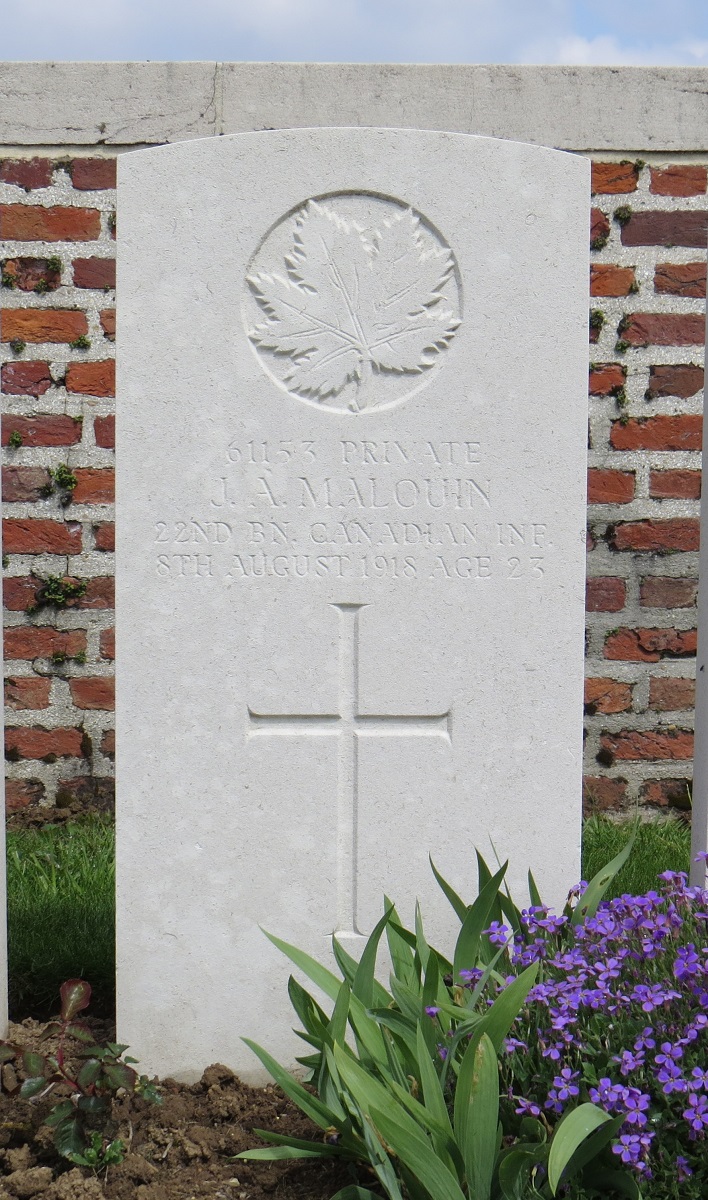CEFRG presents the story of Private Joseph Malouin of “The Van Doos” – 22nd (French Canadian) Infantry Battalion, 5th Canadian Infantry Brigade, 2nd Canadian Division. Joseph entered the war in September of 1915. Soon, he found himself on the sidelines, and invalided back to England to recover from a rare disorder. While convalescing, Joseph had the opportunity to train on a secret weapon. He used this new skill while participating in the very successful opening day of the Battle of Amiens, 8 August 1918.
Joseph Malouin
The Van Doos
Private Joseph A. Malouin 61153 was born 12 Ocober 1893 in Montréal, Québec. He was a Labourer, son of Georges Malouin, of 247, Joliette St., Montreal. Joseph had 3 years prior service with C.A.M.C. Joseph Malouin enlisted with the The Van Doos on 21 October 1914 at Valcartier. He stood 5′ 6″ tall, with dark complexion, brown eyes, and brown hair. Joseph was Roman Catholic. While at Valcartier, in January of 1915, Joseph forfeits 4 days pay, and the following month he forfeited 9 days pay. He sailed for England on 20 May 1915.
Following a summer of training in England, Joseph proceeded overseas with his unit, disembarking at Boulogne-sur-Mer, 15 September 1915. After serving in Belgium for several months, medical issues will keep Joseph from the front lines until mid-1918. Granted 8 days leave, 10 May 1916. Admitted No. 4 Canadian Field Ambulance, Laryngitis, 1 July 1916. Admitted No. 5 Canadian Field Ambulance, Laryngitis, 3 July 1916. To Mont des Cats, (rehabilitation) Laryngitis, 7 July 1916. Admitted to No. 30 General Hospital, Calais, 18 July 1916. Admitted to 1st Eastern General Hospital, Cambridge, 24 July 1916.
Aphonia
Admitted 8 August 1916, and diagnosed with Aphonia. Joseph has no voice at all! Discharged to Woodcote Pack, Epsom, 12 September 1916. Later, examined at Epson, 1 November 1916. Dizzy, headache, pains left chest, discharged 6 November 1916. Finally, admitted to Canadian Divisional Convalescent Hospital, Epsom, 6 November 1916, discharged 6 December 1916.
On 20 April 1917, Joseph completes his Last Will, leaving everything to his father. Soon, Joseph probably had his first exposure to tank development. On 5 December 1917, another medical exam at No. 12 Canadian General Hospital. Joseph is with the 10th Reserve Battalion at this time, and is discharged 17 December 1917. Admitted 2nd Eastern General Hospital, Brighton, V.D.G., 2 February 1917, discharged 24 February 1917. Finally, admitted to Bramshott Hospital, Incontinence, 5 December 1917, discharged 18 December 1917. In early 1918, Joseph returns to training on tanks.
Posted back to 22nd Battalion, 29 March 1918. Arrived with unit in the field, 5 June 1918. During Joseph’s time spent back in England, he must have been a quick learner in tank development, for he is attached to 5th C.I.B. HQ as a Tank Instructor, at Lignereuil Chateau on 10 July 1918. Over the next few days, Joseph participates in several manoeuvres for the benefit of Higher Command.
The Battle of Amiens




Killed in action
On the first day of the Battle of Amiens, casualties in the 22nd Battalion are light, with only five men killed in action. The light casualties must have had much to do with Joseph’s efforts, for he is with a tank crew leading the very successful advance of the 5th Canadian Infantry Brigade. Unfortunately for Joseph, he is one of those five casualties. Joseph is killed during the advance made from the vicinity of Villers-Bretonneux to Wiencourt-l’Équipée, on the afternoon of 8 August 1918.


Vrely Communal Cemetery Extension
Joseph is buried in Vrely Communal Cemetery Extension, Row A, Grave 6. Vrely is a village 32 kilometres East of Amiens, immediately South of Rosieres-en-Santerre. The Extension adjoins the rear of the Communal Cemetery which is West of the village on the road to Caix.

Vrely Communal Cemetery Extension video.
More
Please subscribe to CEFRG to be notified by email when there are new posts. Subscription is free, and your email kept confidential.
